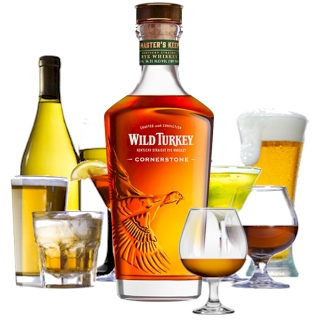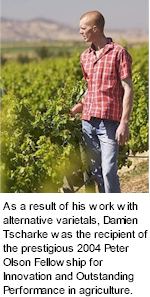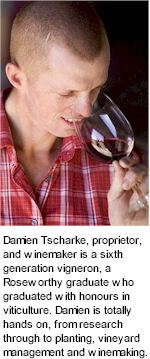


Damien is a sixth generation vigneron and Roseworthy honours graduate. Damien is also the proprietor and winemaker for the acclaimed wines produced under the Glaymond brand, which was established in 2001. His vision to explore and develop alternative varietals in the Barossa Valley led to the establishment of the Tscharke brand in 2004. Having worked on his family's vineyards for over 15 years he has developed an intimate knowledge of the vineyard sites and sub appellations of Marananga and Seppeltsfield in the Barossa Valley.

Whilst respectful of the tradition of growing classic European grape varietals in the Barossa Valley, he believes the climate offers the perfect location for new varietals to be introduced. Following extensive research Tempranillo, Graciano, Montepulciano, Zinfandel and Albarino were selected and planted on the family property between 1999 and 2002. The Tscharke portfolio consists of four wines based on these varietals. The philosophy behind the Tscharke range is to produce wines which are stylistically distinctive, that capture the warmth and richness of the Barossa, whilst offering ripe but balanced fruit with excellent varietal definition.
Damien is completely hands on throughout the process - from research through to planting the vines, vineyard management and winemaking. As a result of his work with alternative varietals Damien was the recipient of the prestigious 2004 Peter Olson Fellowship for Innovation and Outstanding Performance in agriculture.
All of the Tscharke Wines are estate grown and sourced from the Tscharke Vineyards located in Seppeltsfield and Marananga of the Barossa Valley. These vineyards have been farmed by the Tscharke family for generations. The grape varieties chosen for the Tscharke range were pioneered and established by Damien Tscharke, a vision of his to produce a range of wine styles grown from nontraditional grape varietals of Australia.

The wines give Damien the opportunity to express the terroir of the Tscharke Vineyards and viticultural practices used to grow the alternative grapes varieties. The boutique winery is situated on the Marananga Vineyard property situated along the Seppeltsfield road in Marananga. Damien uses open fermenters, a basket press and French and Hungarian oak to help hand craft the unique range of wine styles.
Albarino is a Spanish varietal traditionally grown in the cool wind swept corner of North West Spain and Portugal. Thick skinned, naturally acidic and an early ripening aromatic style, winemaker Damien Tscharke was convinced it would perform incredibly well at the Marananga vineyard. The beauty of Tempranillo is it's suited to a range of climatic conditions. In the warm conditions of the Barossa Valley it shows its ability to produce rich bold wines with excellent acid tannin balance. Like Tempranillo, Graciano is another Spanish varietal, traditionally blended with Tempranillo to produce classic wines. Zinfandel's traditional home is California where it often produces heady powerful wines. The key to this variety is harnessing the primary perfumed, spicy brambly characters whilst avoiding over extraction and jammy flavours. Try this with a juicy chargrilled t-bone steak!
Montepulciano is another exciting continental varietal grape at which Damien excells. Planted across much of Central Italy it is often confused with Vino Nobile di Montepulciano made from Sangiovese - this is not Sangiovese. In Italy it is better known for producing rustic reds, here in the Barossa it produces a style which shows intensity backed by fine drying tannins - the perfect partner to rich gutsy food!
